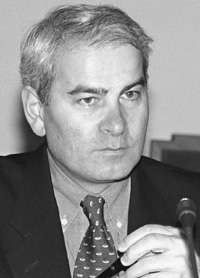Appropriation of World Bank Credits To Be Revised

The World Bank mission headed by World Bank Director for Ukraine and Belarus Luca Barbone completed its work, days after the IMF team had finished its visit here. The results of the WB team visit, as expected, were more encouraging. Speaking at his final press conference on February 14, Mr. Barbone declared that already on March 22 the meeting of bank executive directors is to consider a project to modernize Sevastopol’s heating system, with the main issue, the disbursement to Ukraine of an initial $250 million Program Systemic Loan or PSL, possibly coming on the bank’s agenda in May. It should be added that during its mission’s stay in Kyiv the WB released the last tranche of a credit for the restructuring of Ukraine’s financial sector, although less than expected but it is the fact that matters most. The World Bank does not hinge its financial assistance to Ukraine on the latter’s relations with the IMF, Luca Barbone emphasized, especially with the macroeconomic situation in the country being safe. It is clear that the mission’s goal was to draw up a draft project on a PSL made up of three tranches and whose release will depend on the pace of reforms in Ukraine.
The total amount of the loan is set at $750 million. Although Barbone believes there seem to be no visible impediments to Ukraine getting this money, the country’s government has to continue its efforts to make its ongoing privatization transparent and to secure growing cash payments for electricity and gas. The negotiators have also considered the World Bank credit portfolio for Ukraine for the next six months, analyzing 25 projects that are being drawn up or prepared for implementation.
There was another central aspect that dominated the talks: World Bank representatives, apparently for the first time, could view the reverse side of their financial help and see for themselves that the mechanism of cooperation with the bank is far from perfect. At the seminar in the International Center for Strategic Research, Deputy Director of Ukraine’s Accounting Chamber Vitaly Melnychuk made public the findings of a survey on the use of World Bank loans. According to the World Bank experts, the system for managing the implementation of projects supported by the bank leaves much to be desired. For this reason $270 million worth of loan money, 30% of the total, has been annulled or lost. The overwhelming majority of investment projects completed or nearing completion have fallen short of their declared targets. The effectiveness of the loans remains very low. Of fourteen enterprises that received loans on the basis that such enterprises would repay them from future profits, eleven are financially insolvent and cannot repay $9.5 million in overdue financial commitments to the budget. A large part of such credits were not used for investment but were allocated for the additional funding of executive bodies (in other words, the executives used them to pay themselves more — Ed.). Simultaneously Mr. Melnychuk noted that these loans were not included by the Finance Ministry in the external sources of budget funding, although they are always repaid exclusively from the budget. In such a way, $38 million has been misappropriated. The predominance of projects not related to the economy testifies to the lack of perspective for Ukraine in cooperation with the World Bank, World Bank experts maintain.
Mr. Barbone, who was present at the seminar, said these experts’ findings are “absolutely worthwhile and must be taken seriously into consideration.” In order to do so, he said, it is first necessary “to stick uncompromisingly and rigidly to the established rules and procedures and, if this is impossible, to change the rules.” Otherwise it will not benefit our common efforts, Barbone noted. “We have to be very careful in managing the expenditure of state funds. We are interested to see the appropriate degree of financial accountability for the use of government money.” Barbone believes that positive changes have taken place in his bank’s approach to extending financial assistance. “We are more actively involving government structures in our projects and more is being done for all the participants of this process to be able to perform their roles as required.”






